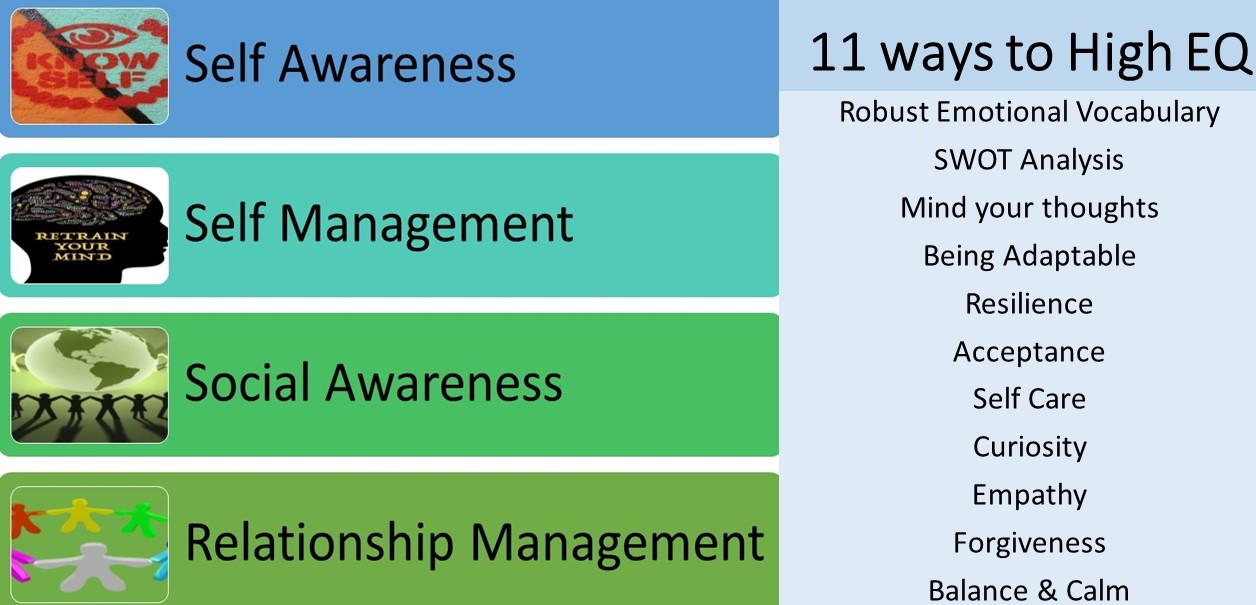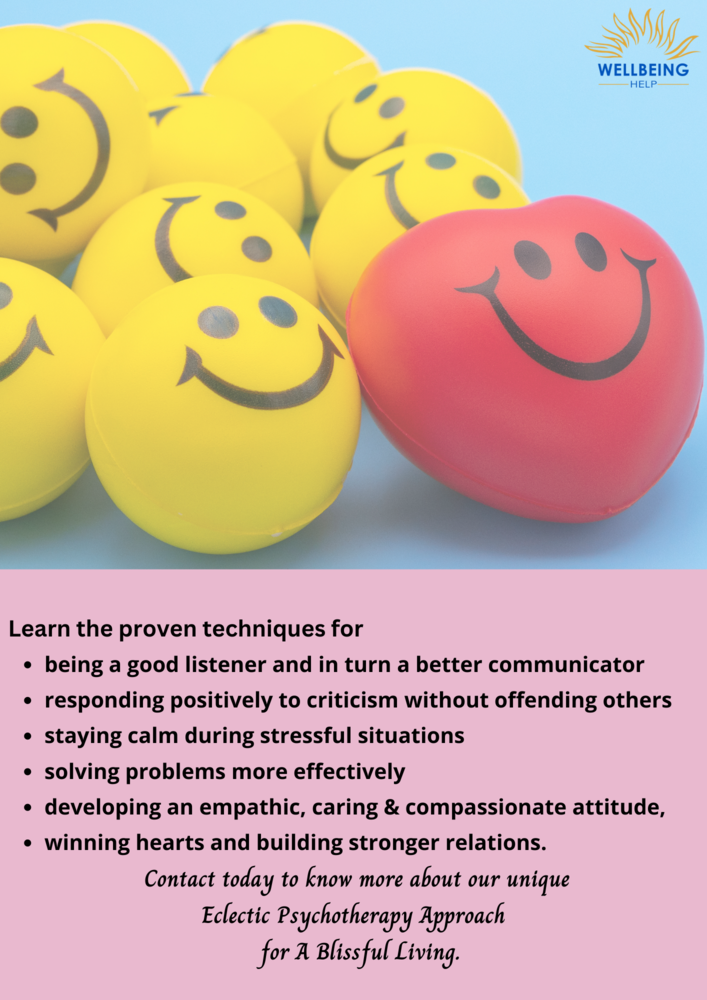Key Points: Emotional Intelligence or EQ consists of Awareness of self and others enabling a person to manage self and relationships and counts more than IQ for being successful in life. This article highlights 11 ways to enhance one’s EQ to live a blissful life.
Knowing how we think, feel, and act and being able to control those emotions is known as emotional intelligence.
- It influences how we interact with others and how we view ourselves.
- It outlines how and what we pay attention to and learn.
- It enables us to set priorities more effectively
- The majority of our daily actions are influenced by it.
In today’s fast-paced world, it can be difficult to manage one’s emotions in a healthy way.
Here is a self check to identify whether you are at peace with your emotions or struggling to find a balance. Are you
- Facing difficulty managing emotions in daily life
- Unable to identify and understand emotions in oneself or others
- Having difficulty communicating effectively in relationships
- Feeling overwhelmed by difficult emotions and unable to cope
- Struggling to regulate emotions and maintain control in difficult situations
- Feeling disconnected from oneself or others, or having difficulty connecting with others
- Experiencing extreme emotional highs and lows
- Difficulty controlling or expressing anger in a healthy manner
If you answered yes to one or more of the above statements, then working on your emotional intelligence may be the best course of action for you.
Four Components of Emotional Intelligence

- Self-awareness: The ability to recognize and understand your own emotions and how they affect your thoughts and behaviors. Self-awareness is an important part of emotional intelligence as it enables you to better understand yourself, your motivations and behaviors, and how they affect the people around you.
- Self-management: The ability to manage and control your own emotions and behaviors. Self-management involves being aware of your emotions, learning how to handle them in a positive way, and making conscious choices that are in line with your values and goals.
- Social awareness: The ability to understand and empathize with the emotions of others. Social awareness involves recognizing the emotions of those around you, understanding how they may be feeling in a particular situation, and showing compassion and empathy towards them.
- Relationship management: The ability to manage and maintain relationships with others. Relationship management involves the ability to build strong relationships with others, resolving conflicts, setting boundaries and limits, understanding how one’s behavior impacts others, and communicating in an effective manner.
In this article, we will explore the key ingredients that make up emotional intelligence (EQ). We will look at some of the skills needed to develop EQ and discuss some practical ways to hone these skills. By understanding these key elements of emotional intelligence, you can start to build your own recipe for success.

Robust emotional vocabulary
When you have a high EQ, you will not only master your emotions but also understand them and use a vast vocabulary of feelings to do so. Even though people occasionally claim to feel “bad,” emotional intelligence actually enables one to identify their emotions as being irritable, depressed, frustrated, or anxious. In other words, when your word choice is specific, you gain a deeper insight into precisely what you are feeling, its origin, and what you must do to overcome it.
Doing a SWOT Analysis
Being emotionally intelligent isn’t just about recognizing emotions, but also understanding what you excel in and what you struggle with. You will know exactly who or what makes you feel a certain way, so that you can put yourself in the best position for success!
Having a high emotional intelligence is like having a superpower: You can identify and use your strengths to the highest degree, and become aware of your weaknesses so that you don’t trip yourself up along the way. It helps you to have faith in yourself and keep pushing the boundaries to reach greater heights!
Knowing who you are is one of the most powerful things you can do. It’s like having an impenetrable force field that stops anyone from getting under your skin and making you feel bad. With a strong sense of self, no one else’s opinion or judgment can affect how you feel about yourself. So you don’t let other people define who you are – take control and own it!
Helpful thinking patterns
Are you allowing negative self-talk to hold you back from reaching your fullest potential? One thing you must bear in mind is that when you ruminate on negative thoughts, you give away your power to them. When you feel as though something always happens or never happens, realize that this is the brain’s way of perceiving a threat. Whenever you have negative thoughts come to your mind, the trick is to ask yourself whether they are facts or opinions.
Emotionally intelligent people can separate their distorted thoughts from facts so that they can escape the cycle of negativity, gain a new outlook of life, and push forward with optimism and positivity. A psychotherapist can assist you in determining whether you have a distorted perception of events and situations. Furthermore, a psychotherapist can also provide tools and strategies to help you replace negative thoughts with more productive and realistic thinking.
Being adaptable to change
When you embrace change, you gain the flexibility and ability to adapt to it on a continuous basis. You can develop this quality by remaining open to learning new things, trying new experiences, and understanding how others think and feel. You will know that fear of change is the reason why you will remain paralyzed and is a major threat to your happiness and success in life. Must look for the change that is lurking around you and then form a plan of action in case these changes happen.
Resilience
If you are emotionally intelligent, then you can learn from your mistakes, use them as motivation to strive for success in the future, and remain focused on the bigger picture. You position yourself for future challenges and succeed when you keep your mistakes out of the way but close enough to refer to them when necessary.
To walk this tightrope between remembering and ruminating, you must have a refined self-awareness. When you dwell on your mistakes in the past, you set yourself up for anxiety. On the other hand, forgetting all about your past mistakes makes it easy for you to repeat them again in the future. The key to balancing these is to learn how to transform your failures into nuggets of improvement. This way, you create a tendency to bounce back up each time you fall.
Acceptance
Emotionally intelligent people don’t set perfection as a target because they know well that perfection does not exist. The truth is, we are all human, and that fact alone makes us fallible. Making perfection a goal creates a nagging feeling of failure that only makes you want to give up. In other words, you end up spending much of your time complaining about your failures and what it is that you could have done differently instead of moving forward. Emotional intelligence allows you to view failure as a lesson to improve yourself. This practice of acceptance of flaws lets you celebrate every small achievement while staying motivated to accomplish more in the future.
Self Care
Technology enables us to constantly communicate and you may be under pressure to be available round the clock. Taking care of your diet and sleep is the first step in this direction. Being able to regularly disconnect from the internet is a sign of high emotional intelligence. Taking some time away from your normal routine to reflect on yourself is one of the best ways to reduce stress and make sure that everything is under control so that you can enjoy the moment. Making yourself accessible around-the-clock exposes you to ongoing stressors.
Allow your body and mind to periodically unwind so that you can just breathe, do nothing, and concentrate on yourself. This would allow to to enjoy some stress-free moments away from the busyness in everyday life.
Curiosity about people
It does not matter whether you are an introvert or an extrovert because if you are emotionally intelligent, you will demonstrate curiosity about the people around you. This kind of curiosity allows you to show empathy, which is a key step toward having a high EQ. Being curious about people means asking questions, engaging in conversations and actively listening to the response. With a curious mind, you show someone that you care about them and what they are experiencing.
Empathy
Emotional intelligence is largely based on social awareness, which essentially means being able to read people and understand them deeply. In other words, it’s the power to know what’s going on with someone’s emotional life – an essential superpower!
It’s valuable to take some time to learn about people and develop your judgement of them. Not only can you get to the bottom of their insecurities, but you can also understand their motivations, and how they form relationships.
Forgiveness
Did you know that when you hold on to grudges, you activate negative emotions as a stress response? Well, each time you think about an unpleasant past event, the body sets into a fight-or-flight mode as a way of surviving. Holding on to grudges tends to elevate our blood pressure and heart disease.
In short, when you hold onto a grudge, you are choosing to hold on to stress. When you let go of a grudge, it is not a sign of weakness. Instead, it makes you feel better and sets you up for improved health and overall wellbeing.
Balance & Calm
Dealing with difficult people is not only frustrating but also energy draining. You can better manage your interactions with toxic people if you have high emotional intelligence because you can better control your emotions.
When you must confront a toxic person, you can take a step back and listen to what the person is saying without taking it personally, and then respond with respect. This allows you to remain neutral and avoid getting into a power struggle. By doing this, you can remain level-headed, open-minded and calm, which gives you a greater chance of finding a resolution that is acceptable for both sides. People with high emotional intelligence can can take toxic people with a grain of salt even when things are completely off course in order to avoid allowing themselves to be demoralised.
Do you let other people’s opinions deprive your sense of pleasure and satisfaction? If you do, then you must realize that you are no longer the master of your happiness. Being emotionally intelligent means that whenever you feel good about something you have done, you will not let anyone’s opinions or remarks take that good feeling away from you.
Yes, it may be hard to switch off your reactions to what they say or think of you. However, you don’t have to compare yourself to them. The trick is to take their opinion with a grain of salt. This way, no matter what others think, do or say about you, you allow your self-worth to rise from within you and take control of your thought process and actions.
‘Blissful Living’ with Wellbeing Help
 It is possible to develop emotional intelligence. As you train your mind to repeatedly practice new, emotionally intelligent behaviors, this promotes the growth of new pathways that make them into habits. Your brain will start reinforcing the use of these behaviors, their connection to the old and destructive behaviors to die off. Before you know it, you start responding to your environment with emotional intelligence without thinking about it.
It is possible to develop emotional intelligence. As you train your mind to repeatedly practice new, emotionally intelligent behaviors, this promotes the growth of new pathways that make them into habits. Your brain will start reinforcing the use of these behaviors, their connection to the old and destructive behaviors to die off. Before you know it, you start responding to your environment with emotional intelligence without thinking about it.
Eclectic therapy is a type of psychotherapy that uses a variety of therapeutic modalities and techniques to tailor treatment to the specific needs of each patient. It is a versatile and all-encompassing strategy that aims to genuinely satisfy the unique needs of the client. If you are thinking of seeking professional help for your emotional and psychological wellbeing, then you can trust Dr Dipti Yadav for her eclectic approach. She would help you discover the foundation of your emotional intelligence as well as any other areas that may need strengthening.
Look no further to enhance your EQ and enjoy a ‘Blissful Living’. Our sessions would incorporate the best practices and techniques leading to higher levels of confidence, optimism, self-control, empathy, and Improved social skills.


